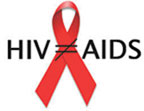
By Mehjabeen Poonawala, Ph. D
AIDS is caused by the Human immunodeficiency virus (HIV), which damages the body’s defense system. People infected with HIV usually live for years without any signs of the disease. They may look and feel healthy, but they can still pass on the virus to others.
HIV is a retrovirus with two primary types: HIV-1 and HIV-2. There are many strains of both types and all mutate rapidly, which has made it particularly difficult for researchers to find an effective vaccine or treatment for the virus. HIV infection is often mostly or entirely asymptomatic (without symptoms) and the most common signs, which include fever, fatigue, rash, and lymphadenopathy (swollen lymph nodes), are often mistaken for mononucleosis, flu, or similar, comparatively harmless diseases.
AIDS is the late stage of HIV infection. People who have AIDS grow weaker because their bodies lose the ability to fight off illness. In adults, AIDS develops seven to 10 years after infection, on an average. In young children, it usually develops much faster.
It is not possible to get HIV /AIDS from touching those who are infected. Hugging, shaking hands, coughing and sneezing will not spread the disease. HIV /AIDS cannot be transmitted through toilet seats, telephones, plates, glasses, eating utensils, towels, bed linen, swimming pools or public baths.
AIDS (Acquired Immune Deficiency Syndrome) is an incurable but preventable disease. HIV (Human Immunodeficiency Virus), the virus that cause AIDS, spreads through unprotected sex (intercourse without a condom), transfusions of unscreened blood, contaminated needles and syringes (most often those used for injecting drugs) and from an infected woman to her child during pregnancy, childbirth and breast feeding.
All people, including children, are at a risk for HIV/AIDS. Everyone needs information and education about the disease and access to condoms to reduce this risk.
Anyone who suspects that he or she might be infected with HIV should contact a health worker or an HIV/AIDS center to receive confidential counseling and testing.
The risk of getting HIV through sex can be reduced if people don’t have sex, if they reduce the number of sex partners, if un-infected partners have sex only with each other, or if people have safer sex- sex without penetration or while using a condom. Correct and consistent use of condoms can save lives by preventing the spread of HIV.
Girls are especially vulnerable to HIV infection and need sup-port to protect against unwanted and unsafe sex.
Parents and teachers can help young people protect themselves from HIV /AIDS by talking with them about how to avoid getting and spreading the disease, including the correct and consistent use of male or female condoms.
HIV infection can be passed from a mother to her child during pregnancy or childbirth or through breastfeeding. Pregnant women or new mothers who are infected with HIV, or suspect that they are infected, should consult a qualified health worker to seek testing and counseling.
Unsterilized needles or syringes, most often those used for injecting drugs, can spread HIV. Used razor blades, knives or tools that cut or pierce the skin also carry some risk of spreading HIV.
People who have a sexually transmitted infection (STI) are at a greater risk of getting HIV and of spreading HIV to others. People with STIs should seek prompt treatment and avoid sexual intercourse or practice safer sex.
NUTRITION AND AIDS
Consuming a balanced diet lessens the impact but does not cure the disease, whereas poor nutritional status definitely contributes to onset of symptoms such as body wasting and fever.
All persons with HIV infections and AIDS need early ongoing medical nutrition therapy. The goal should be to educate individuals about the importance of consuming a well- balanced diet, to provide adequate nutrition for maintenance or improvement in the nutritional status and to prevent protein-energy mal-nutrition and vitamin and mineral deficiencies.


Be the first to comment